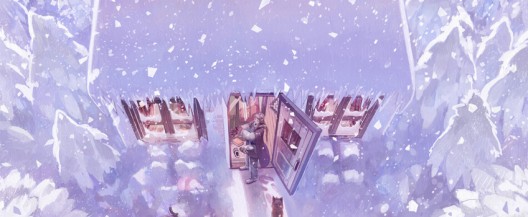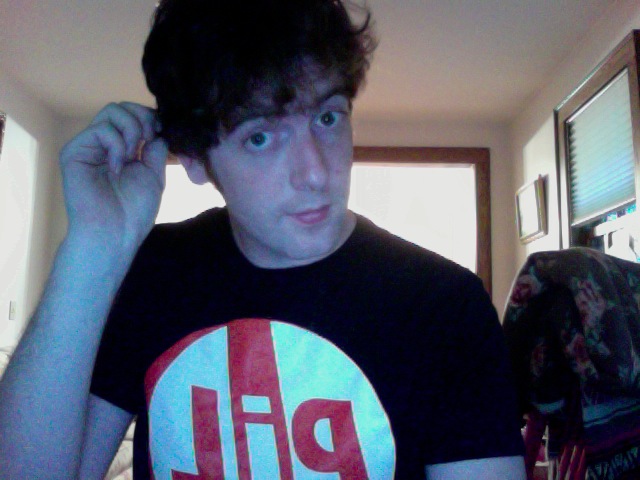Interview
 Friday, January 13, 2012 at 01:54PM
Friday, January 13, 2012 at 01:54PM One of the cooler opportunities that this sporadically (like, very sporadically) updated site has afforded me has been the chance to help a high school senior with his "research a poet" assignment. I found the process of the e-mail interview quite illuminating, given that I'm usually somewhere between laconic and inarticulate when talking about my writing. Perhaps one can still glean that from the lack of concrete detail found below:
Q: I was wondering if you could give me some information about you and your writing process.
A: My name is Zach Buscher. As of three days ago, I am 27 years old. I hail from the Wild West of Massachusetts (AKA Northampton) and currently live in Boston, MA. I am an instructor at Quinsigamond Community College in Worcester, MA and tutor writing at Pine Manor College in Chestnut Hill, MA. I also serve as an Assistant Editor for A Cappella Zoo, a literary journal specializing in Magical Realism (A literary or artistic genre in which realistic narrative and naturalistic technique are combined with surreal elements of dream or fantasy). I formerly served as Poetry Editor for Sonora Review (2008 - 2009), a literary journal managed by graduate students at the University of Arizona. I received my MFA (Master of Fine Arts) in Poetry from the U of A, where I was a Beverly Rogers Fellow, in 2009. Before that, I received a BFA in Writing, Literature, and Publishing from Emerson College in 2007. If I'm lucky, I hope to pursue a PhD in Creative Writing beginning in 2013. My poetry has appeared or is forthcoming in a number of venues: Best New Poets 2011, Pank, La Petite Zine, Back Room Live, Spork, Otoliths, Juked, tinfoildresses, Wheelhouse Magazine, sawbuck, Spooky Boyfriend, My Name is Mud, 580 Split, 42opus, and SHAMPOO. Most of these are online journals, though I don't necessarily consider myself an "online writer" (due in part to my lack of self-promotional skill).
When I started seriously writing poetry at the beginning of 2006, the second semester of my junior year in college, I was more of a narrative poet. My interest in storytelling was informed by my primary literary interest: fiction, novels and short stories. At the time, I thought of poetry as prose with line breaks. Since my prose was already quite musical (lots of rhyme, alliteration, and assonance), I figured making the switch would be easy. Boy, was I wrong. It has taken me until now, seven years later, to feel truly comfortable with a style and voice that I can say feels markedly my own.
Today, I would consider myself a lyric poet. Unlike narrative poetry, which tells a story, lyric poetry deals subjectively (based on personal feelings, tastes, and opinions -- the "I") with the thoughts and feelings of a speaker. I should point out that the speaker of my poems is not always myself; at times, it is an imagined self. Since my poems deal with the problem of being only person (as many multitudes as that person might contain), these imagined selves often resemble me or parts of me (sometimes good parts, other times quite bad).
That said, narrative still makes its way into my poems in that many of the poems suggest a clear story yet refuse to give the whole picture. I once learned, and I believe this, that the best art is ambiguous, not to be confused with ambivalent. Ambiguous means that the work is open to more than one interpretation. Ambivalent suggests that the writer doesn't know what it is the reader should take away. What I'm trying to say (if I'm trying to say anything at all), shouldn't matter to the reader. What I write isn't about communicating a message, or worse still, trying to teach the reader something. I'm as confused about the world as the imagined audience for my poems, and I hope that comes out on the page through the fragmentary (consisting of small parts that are disconnected or incomplete) nature of the work. Here is where form meets content, for the poems I write, the poems I want to write, move in associative ways: they proceed using sound and wordplay rather than through more linear constructions such as argument and plot. I hope that, in this prizing of sound over sense, it's clear the subject of the poems is really just language itself and how it can simultaneously elevate and fail us. Still, there are themes in my poems (the usual ones like love and death) that I'm trying to wrestle with in a tragicomic (both funny and sad) manner.
The only other thing I can say about process, always a mysterious element to me, is that I tend to write mostly in the mid-afternoon and that the best work comes from putting in that time every day. Unfortunately, this doesn't happen enough. I am far too undisciplined. Although I trust hard work and practice over inspiration ("the muse"), I can also tell you that I am inspired by music, visual art, other writers, and my day-to-day experience, particularly social experience. I am more a poet of the city than the forest, after all.
Q: How do you go about stating your poems. Like, what is the first thing you do?
A: A great poet and teacher, Richard Siken (author of Crush, an unbelievable collection that I highly recommend), once described the writer's task as "wrestling with the blank page." I like to give myself a leg-up in this wrasslin' match (sort of like a folding chair. . .) by pulling from one of many MS Word files (I should point out that I do almost all of my writing on a computer, though I do take notes outside my office in a Moleskine notebook or on an iPhone) containing either an individual line or even a single word that I find strange or interesting. Then, I at least have something to build/riff on, be it a title, first line, ending, or even a word or sentence that might not find its way into a later draft. I'm not sure if I mentioned this already, but an important step in this process is to accept that the finished poem may bear little to no resemblance to the one I had in mind when I started.
I should also point out that I often work in sequence or series, a number of poems on the same subject or theme or having the same formal constraints. In this case, I have an outline sketched that suggests where I should go next. This makes individual poems from the series much easier to start, assuming I proceed in order. Perhaps this is one of the reasons that working in sequence is so attractive to many poets. Additionally, it gives you more space to work through your ideas/issues/obsessions.
Q: What are your steps for writing a poem beginning to end?
A: When it comes to poetry, at least for me, this is a hardball question. Since the poems I write aren't particularly straightforward (I mentioned all this towards the bottom of my first long e-mail), there isn't one set of rules or steps to follow. Instead, I'm moving associatively from one thing to the next, trying to serve up my consciousness on the page. Although poems that obsess over the particular (particularly the mundane) details of a poet's life aren't so interesting to most people, poems that show the workings of a speaker's mind more often are.
I feel like one of my unique talents as a writer is the ability to come up with a good title, so the title usually comes first. The problem then becomes writing a poem that lives up to its title.
For beginnings, I go for the hook. I try to imagine myself as a reader for the poem and whether or not the first line or stanza would compel me to read further. Beginnings are important because it's make or break for the reader (as an editor, for better or worse, I won't necessarily read beyond the opening section when judging a work's merits) and sets the tone for the rest of the poem.
As for endings, which are hard, by the way, it's usually a process of either addition or subtraction. Sometimes you write past a logical ending and other times you have to scale the poem back.
Lastly, I am a terrible editor of my own work and therefore try to revise the poem as I go rather than coming back to it. After all, it's hard to put yourself in the mindset you were in when you first started the poem as you are never quite the same person when you come back to it, if that makes sense.



